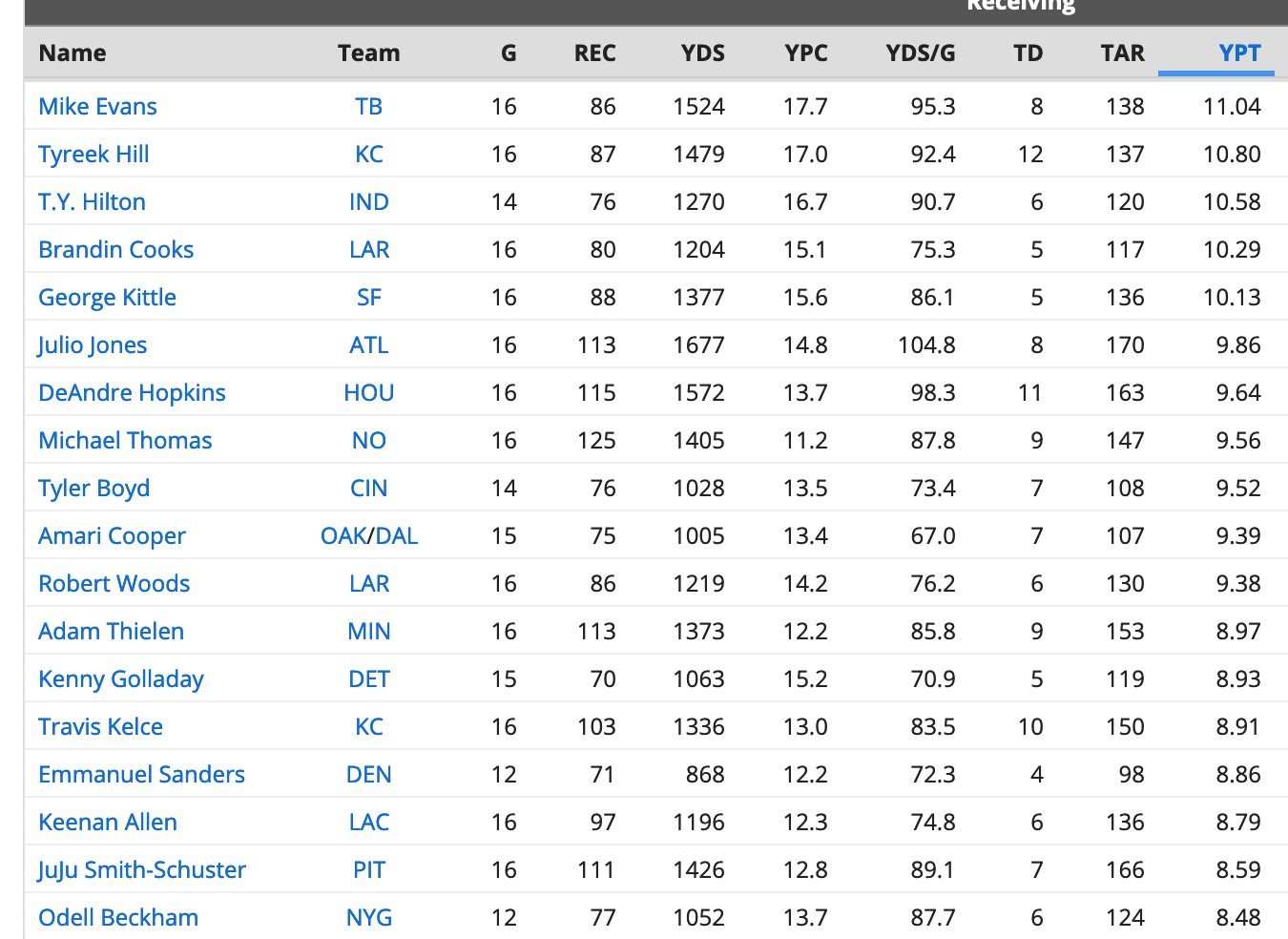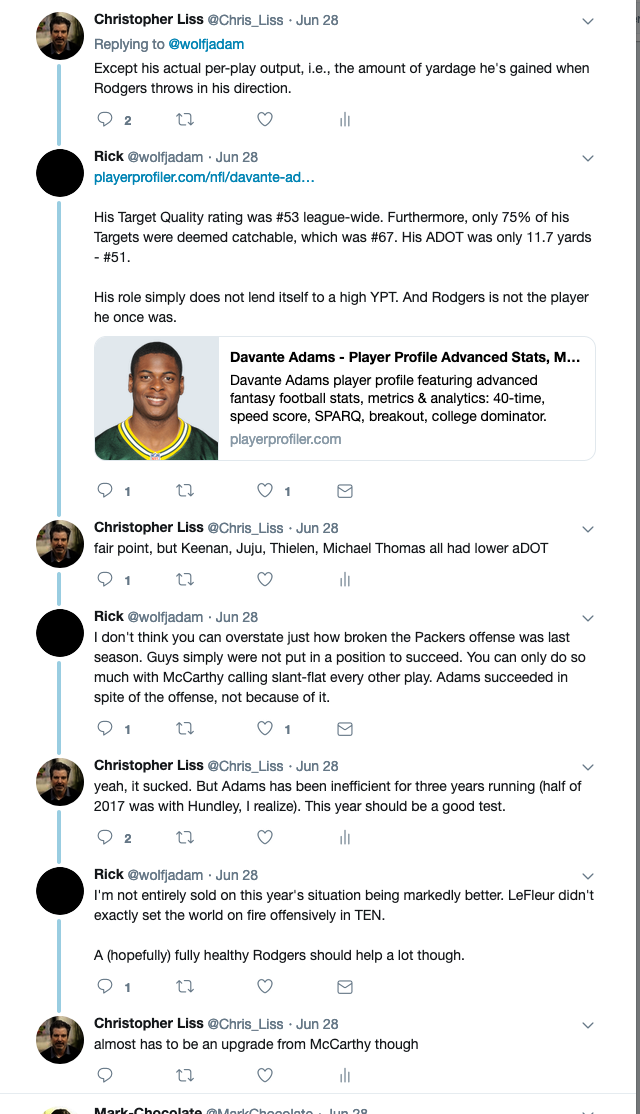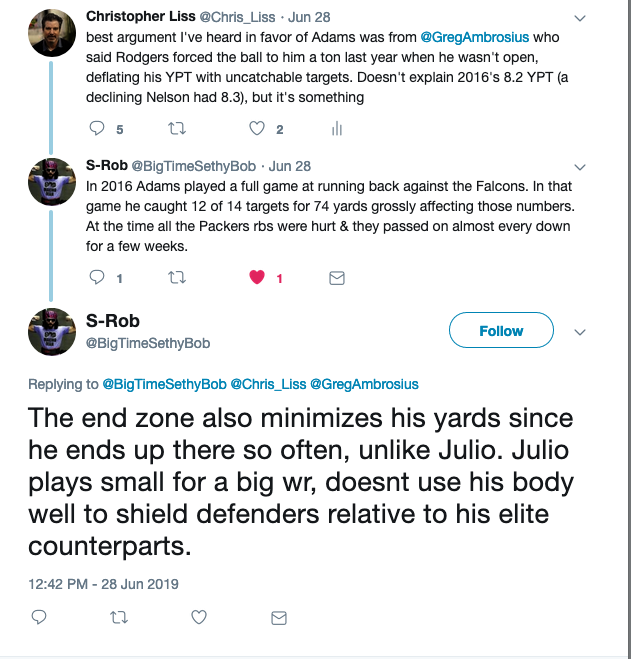The answer to this question actually interests me less than some of the dynamics that popped up over the last week when I dismissed him as "mediocre" in real life, while drafting him with the 11th pick in the FSGA experts league last Thursday night.
Here was the clip that went out over Twitter, and here (scroll down) is but a tiny sampling of the response it got, primarily from Packers fans, but also from some football observers generally.
I have a pretty thick skin when it comes to Twitter mobs -- okay, fine, basically I'm a dumber version of Hitler, I get it. It helps, of course, that unlike cases where the outrage could cause you to lose your livelihood, there will be zero professional or personal consequences to this and SXM seemed to like the attention it generated, i.e., the outrage is if anything actually benefiting me, even if devastating put-downslikethis are destroying me psychologically, emotionally and spiritually.
But it got me thinking about the discussion generally, and I have a couple takeaways.
Context Is Important
The SXM clip where I called Adams mediocre was in the context of my drafting him, the No. 2 WR off the board, with my first-round pick. When I said he was mediocre I meant for a target-dominant, number-one NFL receiver one would consider drafting in the first round. I actually think he's a top-15-20-ish NFL wideout, but that is mediocre in context. You're essentially comparing him to receivers you'd historically draft that early like Andre Johnson, Calvin Johnson, Randy Moss, Terrell Owens, Julio Jones, Jerry Rice, Antonio Brown, DeAndre Hopkins and Odell Beckham.
I run into this issue all the time when, for example, I savage Eli Manning for being so past his prime, and someone tells me Eli is way better as his job than I'll ever be at mine. While more people can surely do my job than Eli's, I'm evaluating him in the context of being a professional NFL QB getting paid $23 million. In that context, he is bottom 10 percent, arguably even worse than a dumber Hitler who so obviously has never watched an NFL snap.
Distinguishing Fantasy from Reality
A fair number of people tried to refute my "mediocre" claim by citing all the TDs Adams scores or the yardage he's put up the last few years. Yes, I'm well aware. I'm the guy who drafted him with the 11th overall pick.
But fantasy is all about total output while reality is about output per opportunity. If your WR puts up five catches for 100 yards and two touchdowns, you don't get less credit if it took him 15 targets to do so. But his real life team surely suffers from those 10 incompletions. So obviously, just quoting his overall output without looking at the amount of opportunity it took to get there, tells you little about his real-life value.
Using Statistics to Assess Real-Life Value
If we accept real-life value must account not only for output but also opportunity, we can consider ways of conceptualizing that. A simple formulation would be output per opportunity or per-play output.
The next step would be to measure per-play output. There are many ways to do this, none of which are perfect, but a simple one I like to use for receivers is yards per target (YPT), i.e., total output divided by total passes thrown in a player's direction. There's potential for noise here -- maybe a receiver had a terrible QB who gave him low-quality targets, or maybe the receiver was open on plays (did his job), but the quarterback didn't look for him. Maybe the coach sent the receiver on shorter, slot routes that moved the chains but resulted in smaller gains.
But when an outside receiver playing with an above-average QB (which Aaron Rodgers still is, even if he's not the guy from five years ago) has never eclipsed 8.2 YPT (15th among the league's 27 100-target wideouts last year), it probably means something. Put differently, Adams has gained a modest number of yards on passes thrown to him every year of his career, and that's mediocre even in the context of 100-target WR, not the 160-ones you'd consider in the first round.
Some people objected to this line of argument, saying I was overvaluing a single metric (YPT), and that it was crazy to base my evaluation solely on that one stat.
I still don't understand how you can assess talent based on ONE stat. That's bonkers. Everything else about Davante's profile suggests at least a very good talent. Unrivaled at the LOS, great route runner, RZ beast. Rodgers calls him "special" all the time. So do NFC North CBs
— Zach Kruse (@zachkruse2) June 28, 2019
I think it's the other way around, i.e., if a player isn't producing a lot of yards per pass thrown his way with Aaron Rodgers as his QB, the burden is on the people claiming he's elite to supply the argument. Yes, it's one stat, but it's a stat that measures total output (yards) per opportunity (targets). And the sample is Adams' entire career.
Here are last year's leaders in that stat among players with 70 catches:
It's plainly not the only relevant metric, and as I said, it can be noisy, but it's a fairly representative list of who's been elite over the course of a season.
Moreover, the arguments cited by Kruse above don't address Adams' modest per-play output. Even if we concede Adams is great at getting off the line and an excellent route runner, the results still stand. It's like arguing a pitcher with a 4.20 ERA over his last 600 innings is actually great because his curve, slider and fastball grade out well from scouts. ERA is noisy and far from perfect, but long-term results even with an imperfect metric are usually indicative of skills, and citing a player's specific positive traits does not make them disappear. Again, to dispute the accuracy of the metric in Adams' case, you need to explain why his skills are not leading to better per-play output, not simply stating those skills exist, citing his good reputation and asking us to ignore them because it's "only one stat."
Here are some good points in Adams' favor made by people on Twitter who disagree with me:
And:
Instead of citing his skills - which should show up in the YPT stat already - they attack the stat as it relates to Adams by arguing the opportunity component is not well measured by it in his case. Imagine if we were evaluating NBA players by true shooting percentage, and one of them graded out more poorly than you'd expect given his otherwise strong profile. Saying he's a great athlete who gets to the rim as well as anyone, or that he has the most perfect shooting form in the league would be bad arguments. Those things are already baked into his true shooting percentage, and that he's still doing poorly despite them means something else is off. But if you showed that his coach and the offense his team runs resulted in the player taking too many long two-pointers and too few three pointers, you'd have an explanation as to why true shooting percentage wasn't a good reflection of his shooting and scoring skills.
I think a similar argument can be made that Mike McCarthy's outdated offense made Rodgers and Adams have to settle for a lot of long twos -- maybe running too many deep outs, patterns that are hard to complete, and result in only medium rather than long gains when successful.
Ascribing Motive
"You'rejustlookingforattention!"
People who have never met me assume they have me figured out.
First off, I didn't tell SXM to post that clip on Twitter, and I didn't retweet the clip. They post quotes from me all the time, some of which I do retweet, and almost none of them go viral.
Second, as the guy who has long claimed Adams is overrated (and already having gotten pilloried for it on Twitter in the past), it was ironic that I was taking him with my first pick and probably required some explaining. I had no idea the clip would get tweeted out and dunked on by Packers beat writers and aggrieved fans taking it out of context. (Though from prior experience I did know there are for God knows what reason a lot of aggrieved Adams fans.)
Dunking and Point Scoring
If you're outright trolling, that's fine. I too am a troll and am guilty of this behavior at times -- though I try to reserve it for people I believe have especially pernicious agendas (usually not sports commentators.) But if you're purporting to debate me on the merits of the case -- whether Adams is an elite or merely top 15-20-ish WR in the NFL -- you won't get anywhere by trying to dunk on or embarrass me.
Alleging I don't understand football or that I've never watched any tape might feel good for you emotionally when writing it, but it reads to me as "this guy is interested in impressing onlookers rather than advancing a real case." Same thing with remarks suggesting that I'm overly blinded by my biases, hopelessly attached to one stat, fighting this battle for attention or whatever. Leave the amateur psychobabble behind and stick to the case. My rule -- in an actual debate where we're ostensibly trying to get at the truth -- is savage the other person's argument, but don't attack the person making the argument. I get that people are sensitive, so sometimes when you rip their argument, they take it personally and retaliate against you personally, but at least conceptually it's been useful for me to separate the two, go after the faulty logic or poorly-supported premises, but do my best to avoid positing what's going on in their head, inventing explanations as to why they're doing something or dunking on them personally.






